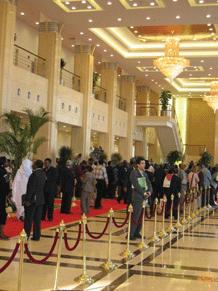
 The first impression you have upon arriving in Khartoum is that all the men are dressed in white djellabas with turbans on their heads, walking in a distinguished manner and carrying black ebony walking sticks-that’s the national costume in Northern Sudan. The women, on the other hand, wear long shirts and skirts, as Sudan is first and foremost a Muslim country, with a minority of Christians in the South.
The first impression you have upon arriving in Khartoum is that all the men are dressed in white djellabas with turbans on their heads, walking in a distinguished manner and carrying black ebony walking sticks-that’s the national costume in Northern Sudan. The women, on the other hand, wear long shirts and skirts, as Sudan is first and foremost a Muslim country, with a minority of Christians in the South.
Years after the signing of the peace agreement in Nairobi, and even if some people claim that there are some weak points in that agreement, people in general tend to be optimistic about the future. New buildings are popping up all over Khartoum, and new roads and bridges are being built. Chinese companies are investing extensively and control Sudan Oil; while Prince Ben-Talal from Saudi Arabia is constructing a new shopping mall. These developments and other construction projects confirm that changes are underway in the Sudanese capital.
 In January, Khartoum hosted the African Union Summit where the President of Congo, Denis Sassou Nguesso, was elected President of the African Union.
In January, Khartoum hosted the African Union Summit where the President of Congo, Denis Sassou Nguesso, was elected President of the African Union.
Mr. Alpha Oumar Konare, the AU chairman.
The Sudanese government had put a lot of effort into the Summit, with the building of a new conference centre to host presidents, delegates and journalists from the whole African continent. Let us mention also the well-equipped press centre equipped with more than 100 new computers and the latest technologies (wifi, fax, telephone, etc.) that the Government had set up for the more than 300 journalists covering the Summit. Nobody can deny that every condition was met in order to make life as painless as possible for the journalists.
 Despite the optimism, there are still problems to be solved after twenty-one years of civil war. In Khartoum there are about 2 million internally displaced persons, mainly refugees from the South who have fled the war zone. In Southern Sudan the infrastructure has been damaged, and there is not a single road in the whole of the South. However, people have recently started to move back and the local government has even hired a company to carry out urban planning so as to provide the city with the necessary infrastructure. Despite the problems,
Despite the optimism, there are still problems to be solved after twenty-one years of civil war. In Khartoum there are about 2 million internally displaced persons, mainly refugees from the South who have fled the war zone. In Southern Sudan the infrastructure has been damaged, and there is not a single road in the whole of the South. However, people have recently started to move back and the local government has even hired a company to carry out urban planning so as to provide the city with the necessary infrastructure. Despite the problems,  Sudan is still the biggest country on the whole African continent and the potential for business and investment is huge. When the Secretary of State for the Ministry of Foreign Affairs, His Excellency Ali Ahemed Kerti, received us, he stressed Sudan’s wish for peace and stability so that they can continue developing the country so that it becomes a better place for the Sudanese people to live in. There are fifty-three different ethnic groups scattered around this huge country that is six times the size of France and thirty-two times the size of Switzerland.
Sudan is still the biggest country on the whole African continent and the potential for business and investment is huge. When the Secretary of State for the Ministry of Foreign Affairs, His Excellency Ali Ahemed Kerti, received us, he stressed Sudan’s wish for peace and stability so that they can continue developing the country so that it becomes a better place for the Sudanese people to live in. There are fifty-three different ethnic groups scattered around this huge country that is six times the size of France and thirty-two times the size of Switzerland.
His Excellency Ali Ahemed Kerti, Secretary of State for the Ministry of Foreign Affairs



